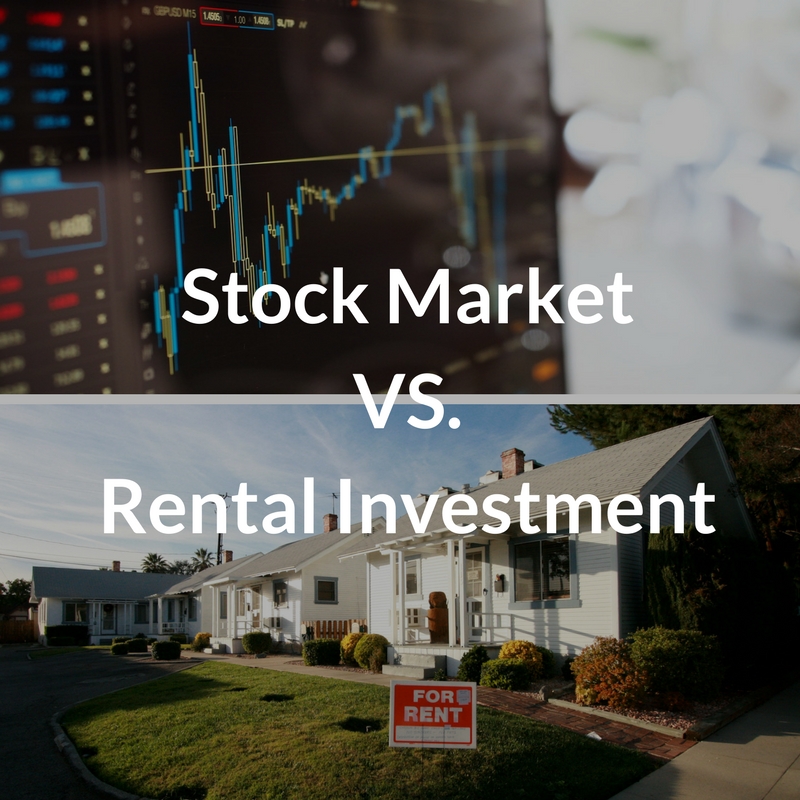
Rental Investment vs. Stock Market: Which Should You Choose?
Having cash in a savings account or in the hidden room behind your bookcase is great for an emergency fund. However, it is not useful for building an investment portfolio that will provide passive income streams. Whether you are investing for lifestyle, for retirement, or for your children, achieving your goals takes patience, wisdom and, above all, strategy.
The power of compounding interest rewards those who invest in assets with consistent long-term growth. Both stocks and real estate holdings are such assets, and each purports to be able to help you achieve this goal. Today, we want to discuss some differences between two so that you can develop the strategy best-suited for your needs.
1. Control
Risk is often a function of control. The more control you have the less risk and vice versa. When you own an individual stock, you have little to no control over its performance. Tesla (TSLA) owners do not get to tell Elon Musk what new products to develop, how to improve manufacturing costs, where to source materials, or who to hire. Shareholders just sit back and hope the leadership doesn't make decisions that cause the stock to drop 72% of its value like Volkswagon (VOW3) did.
On the other hand, real estate offers much more control. You can decide what market to invest in, what type of property to buy, what type of finish it should have, what type of income and rental history guidelines are required for tenants, who is managing the property and so on. Further, if you don't like the financial results you can modify your criteria.

2. Investing for Net Worth or Income
Conventional paper asset wisdom dictates that you invest for growth (stocks) when you are younger and then move to less volatile bonds or money market accounts when you are older. This advice is exclusively based on the theory of building a large account balance prior to retirement and then securing it as you spend it down once your income goes away. In other words, maximize your assets (net worth) so that you can have enough to convert to income later in life. While you certainly can invest for income via dividend stocks, these often have very little growth. Thus, you have to have sufficient cash up front to acquire the stocks.
Unlike investing in paper assets, purchasing real estate allows you to invest for net worth and income. As the home appreciates, your asset value increases. In addition, a portion of the rent goes toward paying down the liability (mortgage balance). Both of these events increase your net worth. The balance of the rent goes towards taxes, insurance, management and your income. This means you do not have to sell your asset in order to put food on the table during retirement.
3. Systemic Risk
Every average financial advisor will tell you that by buying mutual funds you can diversify and avoid the risks associated with individual stocks. Warren Buffet says, "Diversification is protection against ignorance. It makes little sense if you know what you are doing." So, who is right?
As we saw with the Technology sector in 2001 and the broad market in 2008, diversification doesn't protect you against the widespread basic risks associated with being invested in the stock market. These include market bubbles, elections or political uprisings, natural disasters, international crises, CEO statements and more. Buffet's argument gains further credence when you consider that mutual funds help you avoid higher losses of companies like Enron, BP and Volkswagon, but these same funds also help you avoid the higher gains that he and others achieve through educated investing.
Real estate is largely insulated from the geopolitical picture because it serves a basic human need. Even when the real estate market crashed in 2008, cash-flowing rental properties still produced income for their owners. The asset and the investor's net worth may have temporarily lost value, but the monthly income kept coming in. In fact, as we returned to normal home ownership rates, rents went up in many cases.

4. Insurance & Leverage
Speaking of risk, let's evaluate how other professionals view each asset class. Due to both individual and systemic risk, no company will provide an insurance policy against losses in your stock portfolio. Some investors will short the market, hedge or buy products like Collateralized Debt Obligations (CDOs), but in order for these positions to pay, something bad must happen to your asset base.
Like insurance companies, banks will also not accept the risk of your paper asset investments. If you have $25,000, no bank will lend you another $100,000 to purchase $125,000 worth of Amazon stock.
Insurance companies and banks will both participate in your real estate investing endeavors though. Your asset can be insured against damages from people and from nature. And, lenders will line up to loan you money so that you can leverage your $25,000 into a $125,000 cash-flowing and appreciating investment property. This ability to use other people's money is one of the keys to growing your income and net worth quickly.
In conclusion, real estate investing offers control that capitalizing on stock does not. The initial payment you put down is much less since you are using other people's money to purchase the properties. Furthermore, these properties generate income that not only pay the mortgage but also offer you passive income. Real estate is insurable and can be leveraged because it is an income producing, appreciating, physical asset. However you decide to build your investment portfolio, investing in real estate should be part of your plan.

